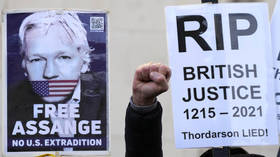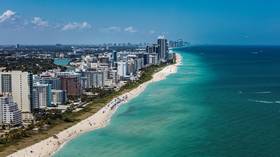Julian Assange’s extradition battle: What you need to know

A British High Court has ruled that Julian Assange can be extradited to the US to face espionage charges. Here’s how the WikiLeaks co-founder ended up behind bars and what could come next.
Assange was placed in London’s Belmarsh Prison in 2019 after nearly seven years of hiding inside the Ecuadorian Embassy in the UK capital.
Who is Julian Assange?
Australian-born Assange co-founded WikiLeaks, a group that publishes classified materials “involving war, spying and corruption,” according to its website.
WikiLeaks famously released a video of US military choppers gunning down civilians in Baghdad in 2007, among other things. The organization also released confidential correspondence between US diplomatic missions around the world, causing further embarrassment for Washington.
Why does Washington want Assange extradited?
The US Department of Justice charged Assange with espionage in 2019, over his role in “one of the largest compromises of classified information in the history of the United States.”
According to the indictment, WikiLeaks illegally obtained roughly 90,000 Afghanistan war reports, 400,000 Iraq war reports, 800 Guantanamo Bay detainee assessment briefs, and 250,000 US Department of State diplomatic cables.
How did Assange end up in British jail?
The journalist first got into trouble after a rape investigation was opened against him in Sweden. Fearing extradition, Assange jumped bail and hid in the Ecuadorian Embassy in London in 2012, where he requested asylum. The rape case against him was eventually dropped.
Assange was ejected from the embassy in 2019 after Ecuador accused him of violating asylum terms. He was immediately arrested by British police and sentenced later that year to 50 weeks in jail for skipping bail.
In January, a London court refused to hand Assange over to the US, citing health concerns. “I find that the mental condition of Mr Assange is such that it would be oppressive to extradite him to the United States of America,” judge Vanessa Baraitser ruled at the time.
The US appealed the decision and won. Ruling in favor of extradition on Friday, Lord Chief Justice Ian Burnett said that Washington provided additional assurances that reduce the risk of Assange committing suicide behind bars. “That risk is in our judgment excluded by the assurances which are offered,” Burnett said.
What’s next for Assange?
Assange’s fiancée, Stella Moris, said his legal team will appeal the decision “at the earliest possible moment.” If the appeal gets thrown out, it will ultimately be for the British government to decide whether to extradite Assange.
In the US, the WikiLeaks co-founder could face up to 175 years in jail, if found guilty on all charges, according to his legal team. Assange’s supporters, family and loved ones repeatedly warned that his health had deteriorated significantly over the years he had spent in confinement.
In 2019, the UN Special Rapporteur on torture, Nils Melzer, whose team visited Assange in Belmarsh, said that he showed “all the symptoms typical for prolonged exposure to psychological torture.”















